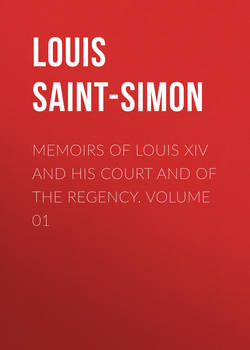Memoirs of Louis XIV and His Court and of the Regency. Volume 01

Реклама. ООО «ЛитРес», ИНН: 7719571260.
Оглавление
Louis Saint-Simon. Memoirs of Louis XIV and His Court and of the Regency. Volume 01
INTRODUCTION
VOLUME 1
CHAPTER I
CHAPTER II
CHAPTER III
CHAPTER IV
CHAPTER V
CHAPTER VI
CHAPTER VII
CHAPTER VIII
Отрывок из книги
I was born on the night of the 15th of January, 1675, of Claude Duc de Saint-Simon, Peer of France, and of his second wife Charlotte de l'Aubepine. I was the only child of that marriage. By his first wife, Diana de Budos, my father had had only a daughter. He married her to the Duc de Brissac, Peer of France, only brother of the Duchesse de Villeroy. She died in 1684, without children,—having been long before separated from a husband who was unworthy of her—leaving me heir of all her property.
I bore the name of the Vidame de Chartres; and was educated with great care and attention. My mother, who was remarkable for virtue, perseverance, and sense, busied herself continually in forming my mind and body. She feared for me the usual fate of young men, who believe their fortunes made, and who find themselves their own masters early in life. It was not likely that my father, born in 1606, would live long enough to ward off from me this danger; and my mother repeatedly impressed on, me how necessary it was for a young man, the son of the favourite of a King long dead,—with no new friends at Court,—to acquire some personal value of his own. She succeeded in stimulating my courage; and in exciting in me the desire to make the acquisitions she laid stress on; but my aptitude for study and the sciences did not come up to my desire to succeed in them. However, I had an innate inclination for reading, especially works of history; and thus was inspired with ambition to emulate the examples presented to my imagination,—to do something and become somebody, which partly made amends for my coldness for letters. In fact, I have always thought that if I had been allowed to read history more constantly, instead of losing my time in studies for which I had no aptness, I might have made some figure in the world.
.....
During the course of this siege, the King suffered a cruel disappointment. James II. of England, then a refugee in France, had advised the King to give battle to the English fleet. Joined to that of Holland it was very superior to the sea forces of France. Tourville, our admiral, so famous for his valour and skill, pointed this circumstance out to the King. But it was all to no effect. He was ordered to attack the enemy. He did so. Many of his ships were burnt, and the victory was won by the English. A courier entrusted with this sad intelligence was despatched to the King. On his way he was joined by another courier, who pressed him for his news. The first courier knew that if he gave up his news, the other, who was better mounted, would outstrip him, and be the first to carry it to the King. He told his companion, therefore, an idle tale, very different indeed from the truth, for he changed the defeat into a great victory. Having gained this wonderful intelligence, the second courier put spurs to his horse, and hurried away to the King's camp, eager to be the bearer of good tidings. He reached the camp first, and was received with delight. While his Majesty was still in great joy at his happy victory, the other courier arrived with the real details. The Court appeared prostrated. The King was much afflicted. Nevertheless he found means to appear to retain his self-possession, and I saw, for the first time, that Courts are not long in affliction or occupied with sadness. I must mention that the (exiled) King of England looked on at this naval battle from the shore; and was accused of allowing expressions of partiality to escape him in favour of his countrymen, although none had kept their promises to him.
Two days after the defeated garrison had marched out, the King went to Dinant, to join the ladies, with whom he returned to Versailles. I had hoped that Monseigneur would finish the campaign, and that I should be with him, and it was not without regret that I returned towards Paris. On the way a little circumstance happened. One of our halting-places was Marienburgh, where we camped for the night. I had become united in friendship with Comte de Coetquen, who was in the same company with myself. He was well instructed and full of wit; was exceedingly rich, and even more idle than rich. That evening he had invited several of us to supper in his tent. I went there early, and found him stretched out upon his bed, from which I dislodged him playfully and laid myself down in his place, several of our officers standing by. Coetquen, sporting with me in return, took his gun, which he thought to be unloaded, and pointed it at me. But to our great surprise the weapon went off. Fortunately for me, I was at that moment lying flat upon the bed. Three balls passed just above my head, and then just above the heads of our two tutors, who were walking outside the tent. Coetquen fainted at thought of the mischief he might have done, and we had all the pains in the world to bring him to himself again. Indeed, he did not thoroughly recover for several days. I relate this as a lesson which ought to teach us never to play with fire-arms.
.....